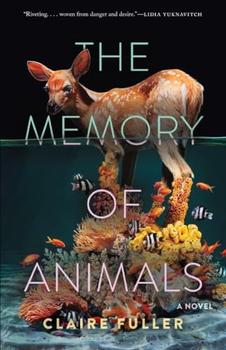Summary | Excerpt | Reviews | Beyond the book | Read-Alikes | Genres & Themes | Author Bio

Set almost entirely in a secure hospital unit in near-future London, The Memory of Animals follows Neffy, a former marine biologist in her 20s, and four fellow volunteers of an experimental vaccine trial. The world has been ravaged by a virus that causes swelling of vital organs. Just as the attempt to find a vaccine begins, a new, far deadlier variant that also targets the brain begins to spread like wildfire. As the streets descend into chaos and the medical staff die or flee, Neffy and the others must find a way to survive within the relative safety of the unit, all while juggling their grief for those left behind in the outside world, tensions within the group, a dwindling food supply and the ever-pressing reality that they may be the last remnants of humanity.
Though the novel very much stands on its own merits, parallels with the Covid pandemic are impossible to ignore. Mention of lockdowns, self-isolation and vaccine trials make the narrative feel just familiar enough for the more exaggerated story elements to seem frighteningly plausible. In this regard, it was also a clever choice by author Claire Fuller to keep the scope of the novel relatively small. Though her characters' situation is extreme and this heightens the drama, their confinement to a single location means the sense of monotony, loneliness, claustrophobia and fear of the outside ring true with many of our own experiences of living through the worst stages of a pandemic.
Around a third of the way into the novel, another important plot point comes into play. Prior to the outbreak, Leon, one of Effy's fellow survivors, was part of a team working on controversial technology that allows users to revisit memories. While this is a solid and intriguing concept, it can seem somewhat disjointed from the rest of the story at first, feeling like a device introduced to facilitate flashbacks into Effy's past, and the concept could have been given more room to breathe (the reader is never given any details as to how the technology actually operates, for example). But as things progress, the different threads of the plot become more entwined, allowing Fuller to explore the fine balance between turning to the past for comfort, accepting the reality of the present and holding onto hope for a better future.
There is another recurring thread that could easily have become a gimmick, but thanks to Fuller's deft hand, it serves instead to enhance the book's core themes. Neffy is a disgraced marine biologist who previously worked with octopuses, struggling to reconcile her fascination for the creatures with her guilt over keeping them in captivity. Through snippets of letters she writes while in the unit, we learn about what led to her dismissal, and Fuller introduces further commentary on notions of confinement, freedom, choice and guilt; all of which her characters continue to wrestle with throughout their self-imposed confinement.
Though it would be easy to consider this simply another in a long list of Covid-19 inspired fiction, The Memory of Animals stands out due to its firm focus on character. The bodily horrors of the virus are present, but they are subtly and sensitively handled, never detracting from the very personal and emotional toll of trying to survive a global pandemic.
![]() This review was originally published in The BookBrowse Review in August 2023, and has been updated for the
July 2024 edition.
Click here to go to this issue.
This review was originally published in The BookBrowse Review in August 2023, and has been updated for the
July 2024 edition.
Click here to go to this issue.

If you liked The Memory of Animals, try these:

by Nicola Yoon
Published 2025
Thrilling with insightful social commentary, One of Our Kind explores the ways in which freedom is complicated by the presumptions we make about ourselves and each other.

by Mustafa Suleyman
Published 2025
An urgent warning of the unprecedented risks that AI and other fast-developing technologies pose to global order, and how we might contain them while we have the chance—from a co-founder of the pioneering artificial intelligence company DeepMind
Life is the garment we continually alter, but which never seems to fit.
Click Here to find out who said this, as well as discovering other famous literary quotes!
Your guide toexceptional books
BookBrowse seeks out and recommends the best in contemporary fiction and nonfiction—books that not only engage and entertain but also deepen our understanding of ourselves and the world around us.